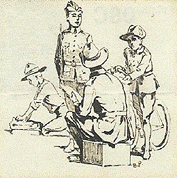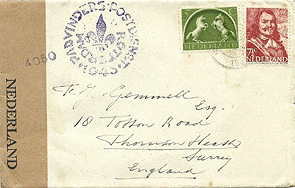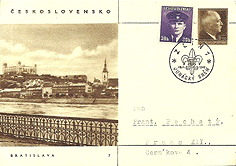
It is not very often these days that an original sketch by Lord Robert Baden-Powell comes up for sale at a
 public auction in the U.K., but recently this one showing Lord Edward Cecil
with one of the Mafeking Cadets, was sold for £620 (about US$ 910, €790)
against an estimate of £200-£300. Signed with B-P's initials, this pen and
ink sketch measuring approximately 4 x 4 inches (10 x 10cm), had the provenance that the seller purchased it direct from C. Arthur Pearson's, the
Publishers. In the earlier edition of Scouting for Boys, this sketch was used
in the Camp Fire Yarn No. 1 and headed "Mafeking Cadets". Baden-Powell
wrote "And the Cadets, under their Sgt.Major, a boy named Goodyear, did
right good work, and well deserved the medals which they got at the end of
the war. Many of them rode bicycles, and we were thus able to establish a
post by which people could send letters to their friends in the different forts,
or about the town, without going out under fire themselves; and we made
postage stamps for these letters which had on them a picture of a cadets bicycle orderly".
public auction in the U.K., but recently this one showing Lord Edward Cecil
with one of the Mafeking Cadets, was sold for £620 (about US$ 910, €790)
against an estimate of £200-£300. Signed with B-P's initials, this pen and
ink sketch measuring approximately 4 x 4 inches (10 x 10cm), had the provenance that the seller purchased it direct from C. Arthur Pearson's, the
Publishers. In the earlier edition of Scouting for Boys, this sketch was used
in the Camp Fire Yarn No. 1 and headed "Mafeking Cadets". Baden-Powell
wrote "And the Cadets, under their Sgt.Major, a boy named Goodyear, did
right good work, and well deserved the medals which they got at the end of
the war. Many of them rode bicycles, and we were thus able to establish a
post by which people could send letters to their friends in the different forts,
or about the town, without going out under fire themselves; and we made
postage stamps for these letters which had on them a picture of a cadets bicycle orderly".
This cover sent from Breda during May 1945 through to Rotterdam and then to England showing the Dutch
censor label was recently sold on eBay for £555.00 (US$ 785, Euro €710). During the Nazi occupation of the
 Netherlands, Scouting was banned, but upon the
liberation of the country on 5th May 1945, the Boy
Scouts were soon reformed. They played an important
role in carrying and delivering mail for the Post
Office, which at that time was in some disorder. The
postal service was run by the Scouts in Rotterdam and
started on 10th May 1945. It lasted until 25th May
when the Post Office in Rotterdam was again
functioning normally. This cover with the circular
purple Scout cachet, which had been designed and cut
from linoleum by a certain Mr. van Eijnsbergen was
posted on 23 May 1945. Considerable information
about the Scout post from this period is available in
the well illustrated colour 132 page book by René Taselaar, which was published in 2009. Written in Dutch,
there is a supplementary book with a translation in English, but without the illustrations.
Netherlands, Scouting was banned, but upon the
liberation of the country on 5th May 1945, the Boy
Scouts were soon reformed. They played an important
role in carrying and delivering mail for the Post
Office, which at that time was in some disorder. The
postal service was run by the Scouts in Rotterdam and
started on 10th May 1945. It lasted until 25th May
when the Post Office in Rotterdam was again
functioning normally. This cover with the circular
purple Scout cachet, which had been designed and cut
from linoleum by a certain Mr. van Eijnsbergen was
posted on 23 May 1945. Considerable information
about the Scout post from this period is available in
the well illustrated colour 132 page book by René Taselaar, which was published in 2009. Written in Dutch,
there is a supplementary book with a translation in English, but without the illustrations.
Since the end of Communism, my Scout stamp collecting hobby has taken me to various countries in
 Eastern Europe. In the near future I will be going to the Czech
Republic followed a month later to Warsaw in Poland. Each of
these countries produced some of the earliest and most
interesting Scout items, and no doubt you are aware that
Romania issued five sets of Scout stamps in the 1930's. One of
the rarest of all Czech Scout cancellations is that of the third
Scout Congress, which should have taken place on 28 February
1948 at Zlin. The Congress had started, but within an hour, the
Scout Association was banned by the Communist Government
throughout the country. The State Police arrived and all
documents as well as the postmark were confiscated. However
they forgot to check the letter box, so a very few postcards and
covers which had been cancelled, were the only items to have survived.
Eastern Europe. In the near future I will be going to the Czech
Republic followed a month later to Warsaw in Poland. Each of
these countries produced some of the earliest and most
interesting Scout items, and no doubt you are aware that
Romania issued five sets of Scout stamps in the 1930's. One of
the rarest of all Czech Scout cancellations is that of the third
Scout Congress, which should have taken place on 28 February
1948 at Zlin. The Congress had started, but within an hour, the
Scout Association was banned by the Communist Government
throughout the country. The State Police arrived and all
documents as well as the postmark were confiscated. However
they forgot to check the letter box, so a very few postcards and
covers which had been cancelled, were the only items to have survived.
I was delighted to read in the latest St. George's Day awards that Colin Walker, our regular contributor to the
SGSC Bulletin and Scout Historian, has been awarded the Silver Acorn, in recognition of specially
distinguished service to the Scout Movement. Congratulations to him on receiving this high award in Scouting,
which was first introduced on St. George's Day in 1933.
|



